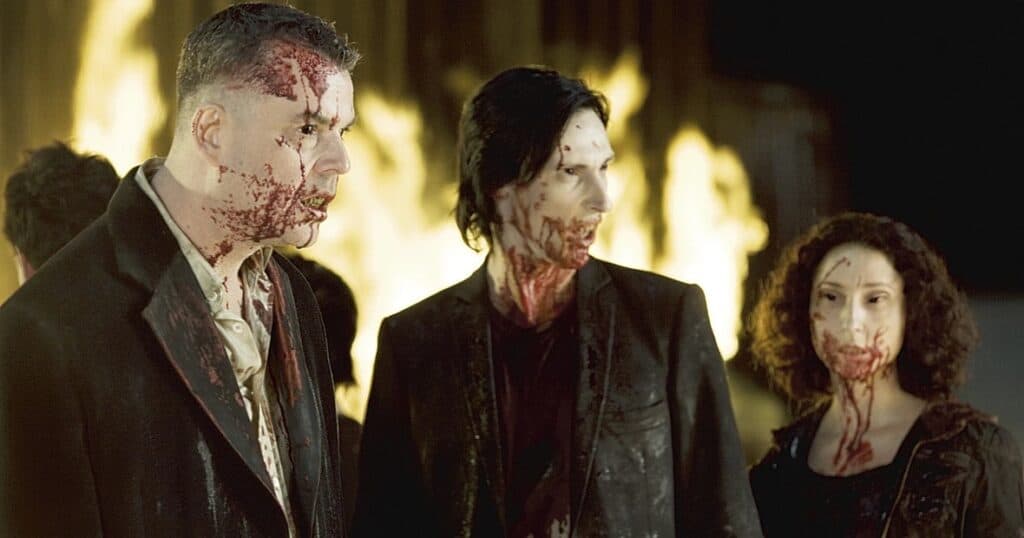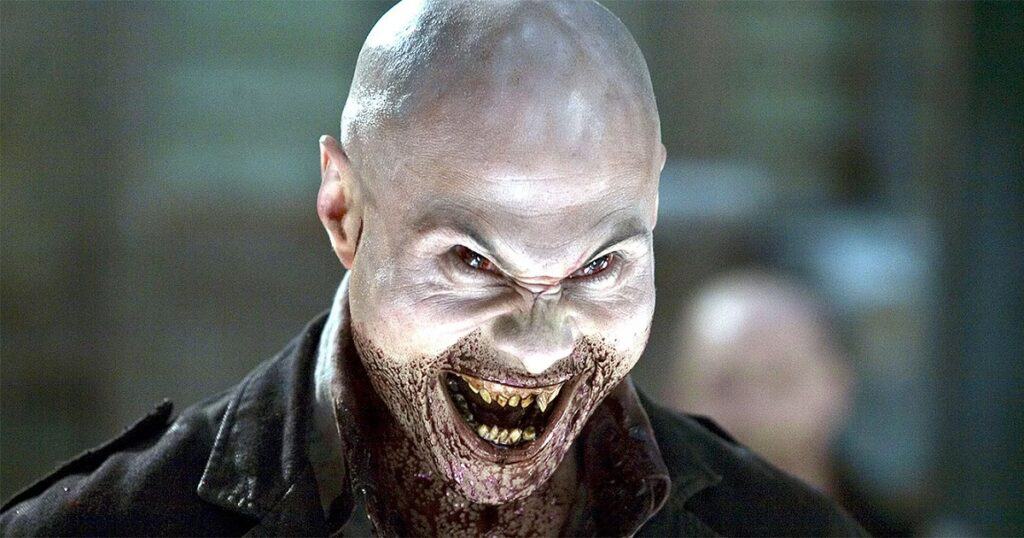I don’t know of many Christmas horror adaptations. Sure, I could probably look at the history of Krampus and piece something together but other than that I’m hard pressed so let me know in the comments what I could cover next holiday season. Winter in general has all sorts of movies and stories that they are based off of. The very first episode of this show was all about The Thing and its source material Who Goes There and now in the middle of winter, at least in Colorado, I think it’s time to look at one of the better vampire properties of the 2000s and a great limited series comic. 30 Days of Night was originally pitched as a movie but when it was turned down, the comic came out and put the author’s name on the map. As is the nature of Hollywood, it got adapted into a movie anyway and even received a direct to video sequel a little bit after. Both are dark, gritty, original pieces of media but how close does the movie stick to its pulpy counterpart? Find a place to hold up for 30 days of night as we find out what happened to this adaptation.
The Movie
The journey for 30 Days of Night (watch it HERE) was not an easy one. The original concept from author Steve Niles was pitched as a comic but there were no takers. He then tried to move it as a film or TV property which also fell through. After he had to shelve the idea for a time, publisher IDW came around and wanted to publish the idea as a limited miniseries of comic books. Once it was a published property, Niles found it much easier to shop the idea around. There was bidding on it and finally horror royalty Sam Raimi won the rights to make an adaptation of it in 2002. His company that would later become Ghost House hired Niles to write the screenplay which was completed in March of 2004. The next month he was asked to re-write it and Stuart Beattie was brought in to do an additional draft which Niles ended up really liking.
Director David Slade was attached to the movie in September of 2005 with yet another writer brought in to do yet another script in March of 2006. Brian Nelson’s script was approved and the movie was shot that summer. Josh Hartnett, Melissa George, and Danny Huston were the lead cast members but it also starred Ben Foster, Mark Boone Junior, and Mark Rendall. Rendall made his debut in kids TV that included a sizable chunk of time on Arthur and for horror also appeared in the incredible TV adaptation of Hannibal. He still does quite a bit of TV into the early 2020s. Mark Boone Junior has become one of the best THAT GUY character actors we have. Depending on the type of stuff you watch, you could know him from his best-known property of Sons of Anarchy or like me know him from that time he was split down the middle in John Carpenter’s Vampires. Ben Foster is a powerhouse of a performer that I feel doesn’t get enough credit. He’s incredible in 3:10 to Yuma and Hell or High Water and for horror showed up in things like Pandorum and the Dead Zone TV series.
Danny Huston is another fantastic actor that I don’t think gets discussed enough and is wonderful as the main vampire here. He is also in The Number 23 and American Horror Story for us gore fans and great other movies like Children of Men and The Proposition to name a couple that I really like. Josh Hartnett has had an interesting career that has come back into focus with his part in Oppenheimer but started his career in Halloween H20. He has worked in Penny Dreadful, The Faculty, and Black Dahlia with a ton of other movies thrown in too. Finally, Melissa George is an Australian actress who I first saw in Dark City but is also great in Alias, The Amityville Horror, and a cool indie horror called Triangle. Behind the camera, director David Slade was a music video guy first, but his movie Hard Candy really got him noticed and three years after this movie, he directed an entirely different type of vampire movie with The Twilight Saga: Eclipse. Stuart Beattie also wrote Collateral and the first Pirates of the Caribbean movie while Brian Nelson also did Hard Candy and Devil. The movie opened in October of 2007 and received decent reviews but more importantly 75 million on its 30-million-dollar budget.

The Story
30 Days of Night started out as a 3 issue short series written by Steve Niles and illustrated by Ben Templesmith. IDW is the publisher, and all 3 entities own the rights to the IP. As stated above it was shopped first as a comic and then as a movie before coming back around as a comic again. Steve Niles hadn’t done too much up to the release of 30 Days of Night but did write a graphic novel adaptation of Richard Matheson’s seminal I Am Legend which became popular again after the release of today’s work. He really took off and published 12 titles in 3 years after the release of Night and worked steadily into 2020. Templesmith has worked with Niles on a few other projects but also worked heavily on the 30 Days of Night universe. He is a multi-Eisner award nominee and has done other things like game books and what I didn’t know at the time but found out after doing the research is he did one of my favorite Dead Space graphic novels too.
The actual 30 Days of Night property has done very well for itself. It had 10 comic collections released between 2002 and 2009, two film adaptations, an audio adaptation, a novelization of the movie, and two mini-series added after the fact too.
What is the Same?
The story takes place in the Alaskan town of Barrow where the residents prepare for the time of year where darkness rules for nearly 30 days. Sherrif Eben starts finding strange things happening around the town such as all cellular phones being destroyed and the appearance of a vagrant stranger to the town who warns the residents but also is the one that scouted ahead and led a group of killers to their town. It turns out that this group of killers is actually a group of vampires led by Marlow who decided to take advantage of the long-lasting darkness to feed on the poor residents of barrow. They also take out some of the power stations and slowly close in on the rest of the townsfolk who hide away and slowly get picked off one by one.
Sheriff Eben decides that there is really no other way to deal with the vampires than becoming one himself and injects some of their blood into his own stream. He turns but has enough humanity left to realize he needs to take out the vampire group and goes for their leader. After a fight in which some of the other vampires are killed too, Eben emerges victorious and saves the remaining townsfolk before admitting he doesn’t want to remain the undead forever. He sits with his wife Stella and watches the sunrise only to die like vampires do. In addition to the basic overall plot with mostly similar names, the movie and book share a very similar dark tone. The art style of the comic is almost minimalist in what it shows while still being an incredibly violent and gory piece of literature. The movie matches this tone with the vampires looking lifeless but simultaneously brutal. There is a washed-out tone that fits with the forever night feeling.

What is different?
A surprising amount was changed here considering both how shorth the source material is and the fact that the author had a lot to do with the movie. The book stranger that comes into town seems to be almost vampire already and is killed by Eben and his team while in the movie, he talks about how he expects the vampires to turn him and make him one of their pack. He is also killed by Marlow when the vampires go to investigate the jail. Marlow in the movie is the leader of the vampire crew but in the comics, he is actually killed by Vicente who comes to Barrow to clean up the mess that Marlow has made. He finds out about the mission through emails and there is a whole other group that is trying to prove the existence of vampires. Eben kills Vicente in the climactic fight instead of Marlow.
The movie also focuses on a handful of other side human characters while the comics just focus on the vampire’s story and lore and Eben and Stella on the human side. Speaking of Stella and Eben. In the Comics they are happily together but the movie adaptation has them separated and Stella almost getting out of dodge on the last flight before missing it and coming back. Ebens family is also a much stronger presence in the movie and ties back to what I said about the other characters getting more screen time and story. This gives the movie much higher stakes in my opinion and is almost more tragic as we care about the people of Barrow and their families more on screen.
Legacy
This is a tough one because if we are just talking about legacy in terms of entries, the comic has the movie beat by a mile. It’s universe was expanded by multiple authors and the lore of the vampires within creates an entire universe to explore. The movie got a direct to video sequel that really isn’t too bad and sits in a weird time for vampire movies with it’s ultra violence being juxtaposed with the Twilight movies romantic teenager nonsense. When I think about which one I prefer, I go with the movie. While the comic is much deeper and a good, original story, its also just a lot to get through and keeps asking new questions with each new entry. The movie is a solid snow/winter tale that I can just throw on without much thought and is a fun movie to recommend to people looking for something a little different. It expands enough on the story in it’s relatively lengthy runtime of 114 minutes while delivering on the gore and monster action we crave. The comic is good, original, and extensive but the movie is just a lot more fun to get through.
A couple of the previous episodes of WTF Happened to This Adaptation? can be seen below. To see the other shows we have to offer, head over to the JoBlo Horror Originals YouTube channel – and subscribe while you’re there!
The post 30 Days of Night (2007) – WTF Happened to This Adaptation? appeared first on JoBlo.
No comments:
Post a Comment